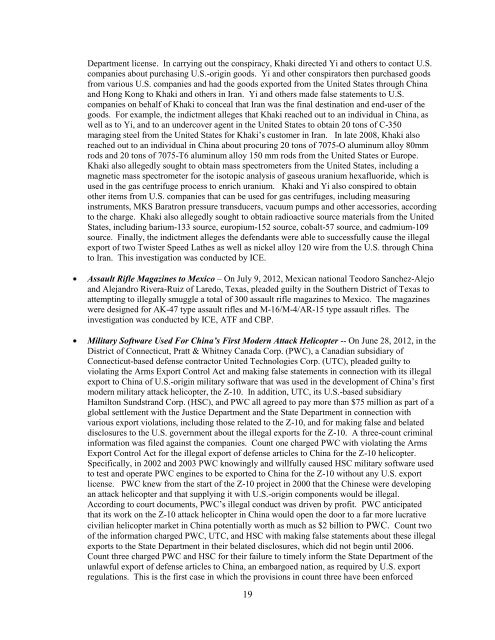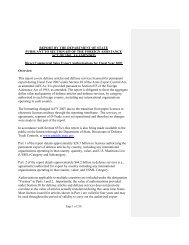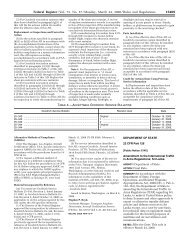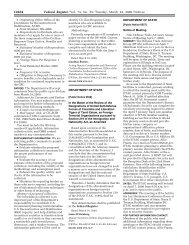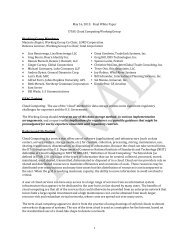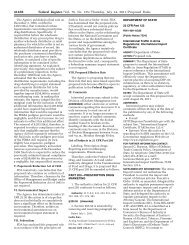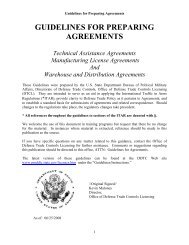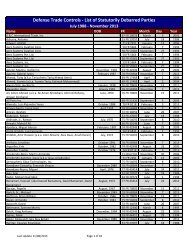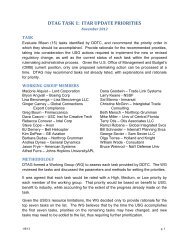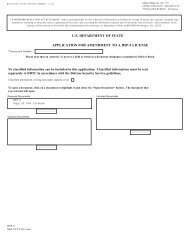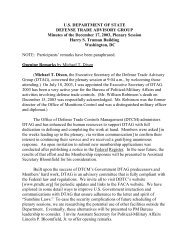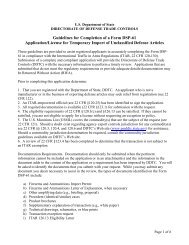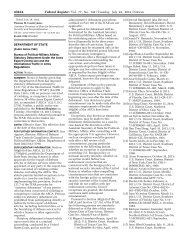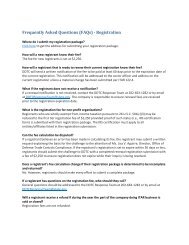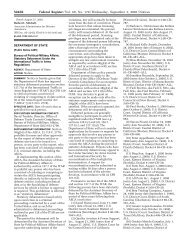Major Export Enforcement Cases - Directorate of Defense Trade ...
Major Export Enforcement Cases - Directorate of Defense Trade ...
Major Export Enforcement Cases - Directorate of Defense Trade ...
You also want an ePaper? Increase the reach of your titles
YUMPU automatically turns print PDFs into web optimized ePapers that Google loves.
Department license. In carrying out the conspiracy, Khaki directed Yi and others to contact U.S.<br />
companies about purchasing U.S.-origin goods. Yi and other conspirators then purchased goods<br />
from various U.S. companies and had the goods exported from the United States through China<br />
and Hong Kong to Khaki and others in Iran. Yi and others made false statements to U.S.<br />
companies on behalf <strong>of</strong> Khaki to conceal that Iran was the final destination and end-user <strong>of</strong> the<br />
goods. For example, the indictment alleges that Khaki reached out to an individual in China, as<br />
well as to Yi, and to an undercover agent in the United States to obtain 20 tons <strong>of</strong> C-350<br />
maraging steel from the United States for Khaki’s customer in Iran. In late 2008, Khaki also<br />
reached out to an individual in China about procuring 20 tons <strong>of</strong> 7075-O aluminum alloy 80mm<br />
rods and 20 tons <strong>of</strong> 7075-T6 aluminum alloy 150 mm rods from the United States or Europe.<br />
Khaki also allegedly sought to obtain mass spectrometers from the United States, including a<br />
magnetic mass spectrometer for the isotopic analysis <strong>of</strong> gaseous uranium hexafluoride, which is<br />
used in the gas centrifuge process to enrich uranium. Khaki and Yi also conspired to obtain<br />
other items from U.S. companies that can be used for gas centrifuges, including measuring<br />
instruments, MKS Baratron pressure transducers, vacuum pumps and other accessories, according<br />
to the charge. Khaki also allegedly sought to obtain radioactive source materials from the United<br />
States, including barium-133 source, europium-152 source, cobalt-57 source, and cadmium-109<br />
source. Finally, the indictment alleges the defendants were able to successfully cause the illegal<br />
export <strong>of</strong> two Twister Speed Lathes as well as nickel alloy 120 wire from the U.S. through China<br />
to Iran. This investigation was conducted by ICE.<br />
Assault Rifle Magazines to Mexico – On July 9, 2012, Mexican national Teodoro Sanchez-Alejo<br />
and Alejandro Rivera-Ruiz <strong>of</strong> Laredo, Texas, pleaded guilty in the Southern District <strong>of</strong> Texas to<br />
attempting to illegally smuggle a total <strong>of</strong> 300 assault rifle magazines to Mexico. The magazines<br />
were designed for AK-47 type assault rifles and M-16/M-4/AR-15 type assault rifles. The<br />
investigation was conducted by ICE, ATF and CBP.<br />
Military S<strong>of</strong>tware Used For China’s First Modern Attack Helicopter -- On June 28, 2012, in the<br />
District <strong>of</strong> Connecticut, Pratt & Whitney Canada Corp. (PWC), a Canadian subsidiary <strong>of</strong><br />
Connecticut-based defense contractor United Technologies Corp. (UTC), pleaded guilty to<br />
violating the Arms <strong>Export</strong> Control Act and making false statements in connection with its illegal<br />
export to China <strong>of</strong> U.S.-origin military s<strong>of</strong>tware that was used in the development <strong>of</strong> China’s first<br />
modern military attack helicopter, the Z-10. In addition, UTC, its U.S.-based subsidiary<br />
Hamilton Sundstrand Corp. (HSC), and PWC all agreed to pay more than $75 million as part <strong>of</strong> a<br />
global settlement with the Justice Department and the State Department in connection with<br />
various export violations, including those related to the Z-10, and for making false and belated<br />
disclosures to the U.S. government about the illegal exports for the Z-10. A three-count criminal<br />
information was filed against the companies. Count one charged PWC with violating the Arms<br />
<strong>Export</strong> Control Act for the illegal export <strong>of</strong> defense articles to China for the Z-10 helicopter.<br />
Specifically, in 2002 and 2003 PWC knowingly and willfully caused HSC military s<strong>of</strong>tware used<br />
to test and operate PWC engines to be exported to China for the Z-10 without any U.S. export<br />
license. PWC knew from the start <strong>of</strong> the Z-10 project in 2000 that the Chinese were developing<br />
an attack helicopter and that supplying it with U.S.-origin components would be illegal.<br />
According to court documents, PWC’s illegal conduct was driven by pr<strong>of</strong>it. PWC anticipated<br />
that its work on the Z-10 attack helicopter in China would open the door to a far more lucrative<br />
civilian helicopter market in China potentially worth as much as $2 billion to PWC. Count two<br />
<strong>of</strong> the information charged PWC, UTC, and HSC with making false statements about these illegal<br />
exports to the State Department in their belated disclosures, which did not begin until 2006.<br />
Count three charged PWC and HSC for their failure to timely inform the State Department <strong>of</strong> the<br />
unlawful export <strong>of</strong> defense articles to China, an embargoed nation, as required by U.S. export<br />
regulations. This is the first case in which the provisions in count three have been enforced<br />
19


